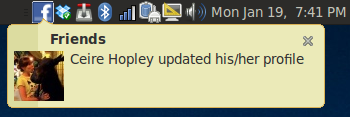 Happy easter to all, what’s better than celebrate this holiday taking a look at what have hidden the programmers in our software ?
Happy easter to all, what’s better than celebrate this holiday taking a look at what have hidden the programmers in our software ?
A virtual Easter egg is an intentional hidden message, in-joke or feature in a work such as a computer program, web page, video game, movie, book or crossword. The term was coined—according to Warren Robinett—by Atari after they were pointed to the secret message left by Robinett in the game Adventure.
Continue reading »
 As the name suggest this small python script use your notification area to show you what’s going on in your Facebook account.
As the name suggest this small python script use your notification area to show you what’s going on in your Facebook account.
It notifies you when any of the following events occur
- One of your friends changes their status, profile picture, or profile details
- You receive a friend request, event or group invitation
- Someone writes on one of your friends walls
- One of your friends is tagged in a photo
 Gnome 2. Anonymous browsing with Tor By Francesco Di Leo.
Gnome 2. Anonymous browsing with Tor By Francesco Di Leo.
I wanted to experience the thrill of browsing anonymously, or to a navigation system that does not easily reveal the information on the connection you use. The choice of which software to use is gone on Tor, but only because it is the most famous. Personally, I proceeded to download the latest version of TOR available for my GNU/Linux directly from its site.
Continue reading »
 Brief introduction, on April 15 2011 Oracle announced that it will abandon the development of the commercial version of Open Office and so the project will become officially a community only driven project. Or: goodbye OpenOffice, welcome libreoffice.
Brief introduction, on April 15 2011 Oracle announced that it will abandon the development of the commercial version of Open Office and so the project will become officially a community only driven project. Or: goodbye OpenOffice, welcome libreoffice.
Original article By: Michael Dorf
When Oracle acquired Sun Microsystems, Sun was actively sponsoring a number of open source projects. In the past, Oracle has had limited success with open source software and many felt that Oracle didn’t understand open source. As Oracle began to assimilate the various parts of Sun Microsystems, the community waited and watched to see if Oracle would be a good open source citizen.
The community didn’t need to wait long. One of Oracle’s first missteps in the open source community came when they filed a patent infringement lawsuit against Google’s Android platform. This suit rocked the open source community as many viewed it as a poor use of Sun’s Java related patents. It has also caused many in the community to question the future of Java. And for those that relied on other Sun open source projects, it called into question the future of those projects.
As comment of the article Knockd, to secure your ports, i’ve received:
“Port knocking is bad idea; a very bad idea.
Port knocking is, in the end, a password. A sniffable one that is subject to man-in-the-middle attacks so you can’t even use one-time-passwords and be secure.
Public/private key pairs and/or one-time-passwords (opie, skey and the like) are the real solutions, along with dynamic monitoring to prevent DOS CPU resource exhaustion attacks. (OpenBSD’s PF incorporates a nice solution, as does the iptables with fail2ban/denyhosts/etc. Even swatch can work wonders.)”
Well, in my opinion knockd it’s a layer of security, perhaps thin but still can save you from some brute force script and so it adds a bit of security to your solution, in this article i’ll show you fail2ban that add another layer of security to our network services.

